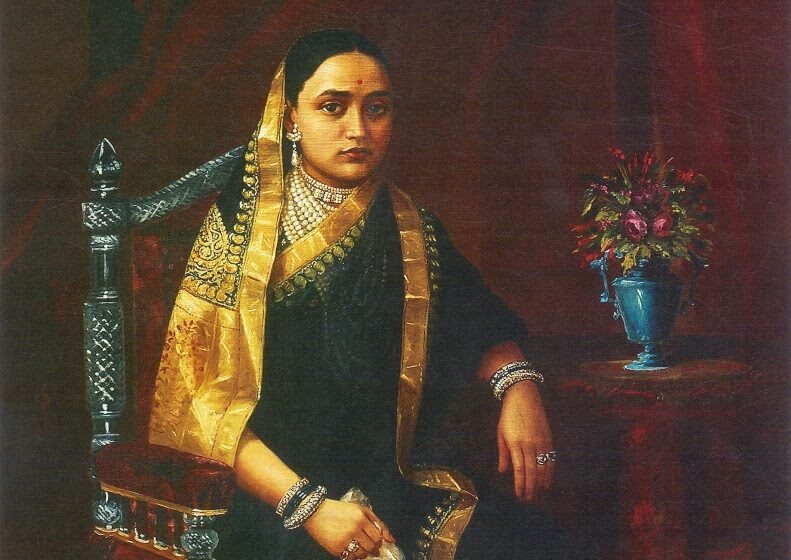A Legacy of Strength and Grace: Maharani Chimnabai II of Baroda

Maharani Chimnabai II of Baroda
Maharani Chimnabai II born to Shrimant Sardar Bajirao Amritrao Ghatge of Dewas and married to Maharaja Sayajirao Gaekwad III, she was a prominent female leader of Baroda and an advocate for women’s rights. She went on to abolish regressive systems and became the first president of All India Women’s Conference. Her legacy continues to be an inspiration.

Early life
Maharani Chimnabai II was born in 1872 to Dewas’ Shrimant Sardar Bajirao Amritrao Ghatge. At the age of 13 she got married to Maharaja Sayajirao Gaekwad III who was the Maharaja of Baroda’s princely state. He belonged to the royal Gaekwad dynasty of Marathas. Maharani Chimnabai’s birth name was Shrimant Gajrabai Devi and was renamed by her husband after their marriage. She was his second wife after Chimnabai I, princess of Tanjore passed away in 1885.
Married life
Maharani Chimnabai II also displayed a belief in progressive ideas similar to her husband. In 1887 the couple travelled abroad a lot, with the wish to introduce her to progressive thought and hope of having her support him to bring that progress to Baroda he started to educate her. Her husband, in the journal The Nineteenth Century, hinted that it had been her influence that convinced him to encourage his subjects to educate and uplift their women.

Her daughter
Chimnabai II gave birth to Indira Devi who was married to Maharaja Jitendra Narayan making her the queen of the princely state of Cooch Behar. Jaipur’s famous Maharani Gayatri Devi was hence her granddaughter in relation.

THE WOMAN DEDICATED TO WOMEN RIGHTS
An author
In 1911, Maharani Chimnabai Co-authored a book with S.M. Mitra. The book was titled “The Position of Women in Indian Life.” As the name suggested the book spoke on the role that Indian woman played in the society and the status they held. It was interesting as it also came from the perspective of a maharani with a progressive perspective. It included topics of women’s influence along with a critique at practices that women fell victims to and had no control over. All these issues were relevant and needed to be issued in times when women held so little authority.

The Purdah System
This system practiced seclusion of women from the public view. It was often the reason women were supposed to cover their heads and keep their faces hidden. Though Maharani Chimnabai followed it when in Baroda, she did think critically of it. With her husband’s matching progressive ideology and support however, at Nyay Mandir in 1914 she made a public appearance abandoning “the purdah” marking the end of the purdah system in Baroda. She sat on the same sofa as Maharaj, it must have been considered a bold move back then but it made people view her prominence as a female leader nonetheless.

On child marriage
She had a clear stance on what she thought of child marriage. Even in her book she pointed out the harm that child marriage potentially had on young girls. She believed that women before they are properly mentally, emotionally, and physically developed should not be forced into the institution of marriage. The expectations exacted onto women as a consequence of marriage exceeded what an underage girl could have healthily carried out. She recognised the paramount role of education in trying to change the mentality that supported such an institution.

All India Women’s Conference 1927
Founded in Pune, All India Women’s Conference aimed at bringing women across India to address various issues pertaining to women’s rights. Some of the major objectives were promotion of education for women and conversation on topics like child marriage and dowry. Maharani Chimnabai was chosen to be the president of this conference.
Chimnabai II’s contribution and advocation of women rights in India has served and continues to serve as an inspiration to women in India. She gave her entire life to uplift women and this legacy of hers has left a mark on every woman that has come across her story and contribution.

LEGACY
All that Maharani Chimnabai II of Baroda did as a progressive Indian female leader is a part of her legacy, one that generations to come will hold in high regard. Be it her book that gives an opportunity to identify and witness position of women in India back in the beginning of 20th century and notice if there are distinguishable changes in the current state of womanhood, or the fact that she successfully singlehandedly abolished purdah in Baroda back in 1914 or that she chaired as the first ever president of All India Women’s Conference and gave her stance in presence of power women leaders from all over India like Ms. Sarojini Naidu, Rajkumari Amrit Rao, Ms. Kamala Devi Chattopadhya and Mathu Laxmi Reddy, all continues to leave people in awe of her and her work.

Being an advocate for women and their education, she provided financial help to educational institutions and also provided scholarships for young girls in Gujarat. She strived to encourage people to step away from traditional practices that suppressed women like marrying them underage and dowry during marriage. Through this woman also felt empowered and began to think of fighting for themselves and their rights.
She established various different institutions for upliftment of women. This included her becoming the president of Maharani Chimnabai Mahila Pathshala which was an initiative towards education of girls in schools. In 1914 she kept the foundation for Shree Chimnabai Stree Udyogalaya after her trip from abroad where she noticed several intuitions that catered to women’s welfare. Located near the sursagar lake, this was a training institute build for women.

Some of her other initiatives were Maharani Chimnabai High School, recently it was said that this school being one of the last Marathi medium schools planned to make education free for the students. Maharani Chimnabai Maternity and Child Welfare League and Maharani Chimnabai Ladies Club were some of her other contributions towards the women and girls of Baroda.
Maharani Chimnabai II contributed crucially to the empowerment of women in India. She herself smashed stereotypes without offending anyone and in that way encouraged her fellow women to start believing in themselves. She is remembered as a progressive leader, an author and someone young girls can look up to for generations to come.


